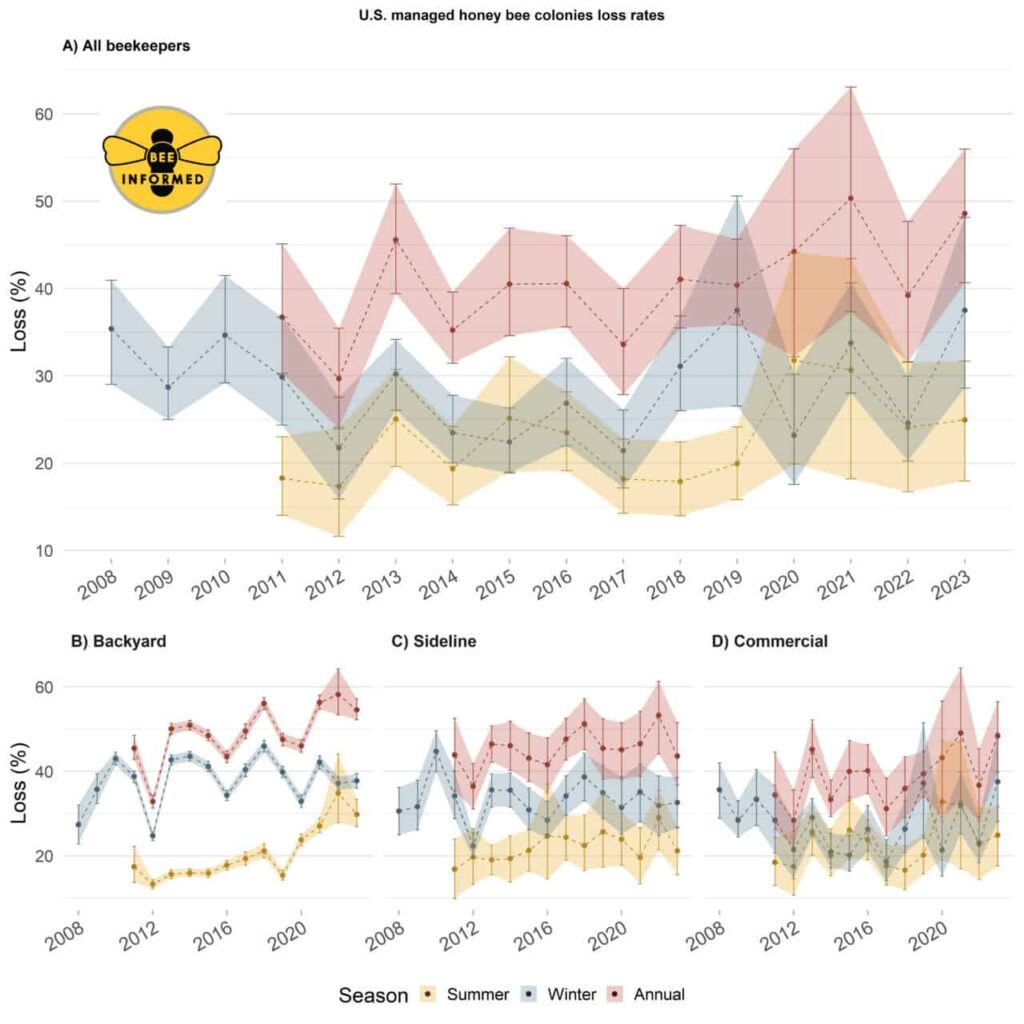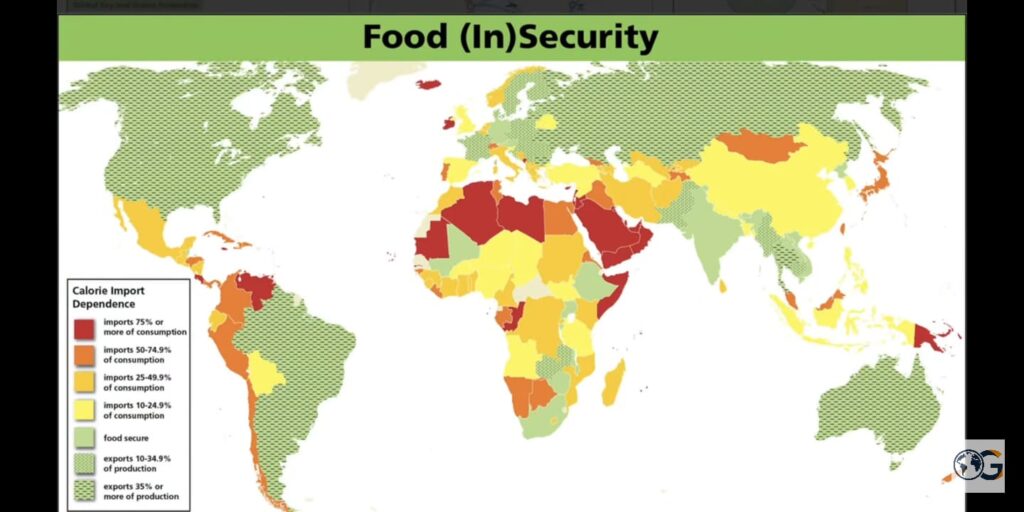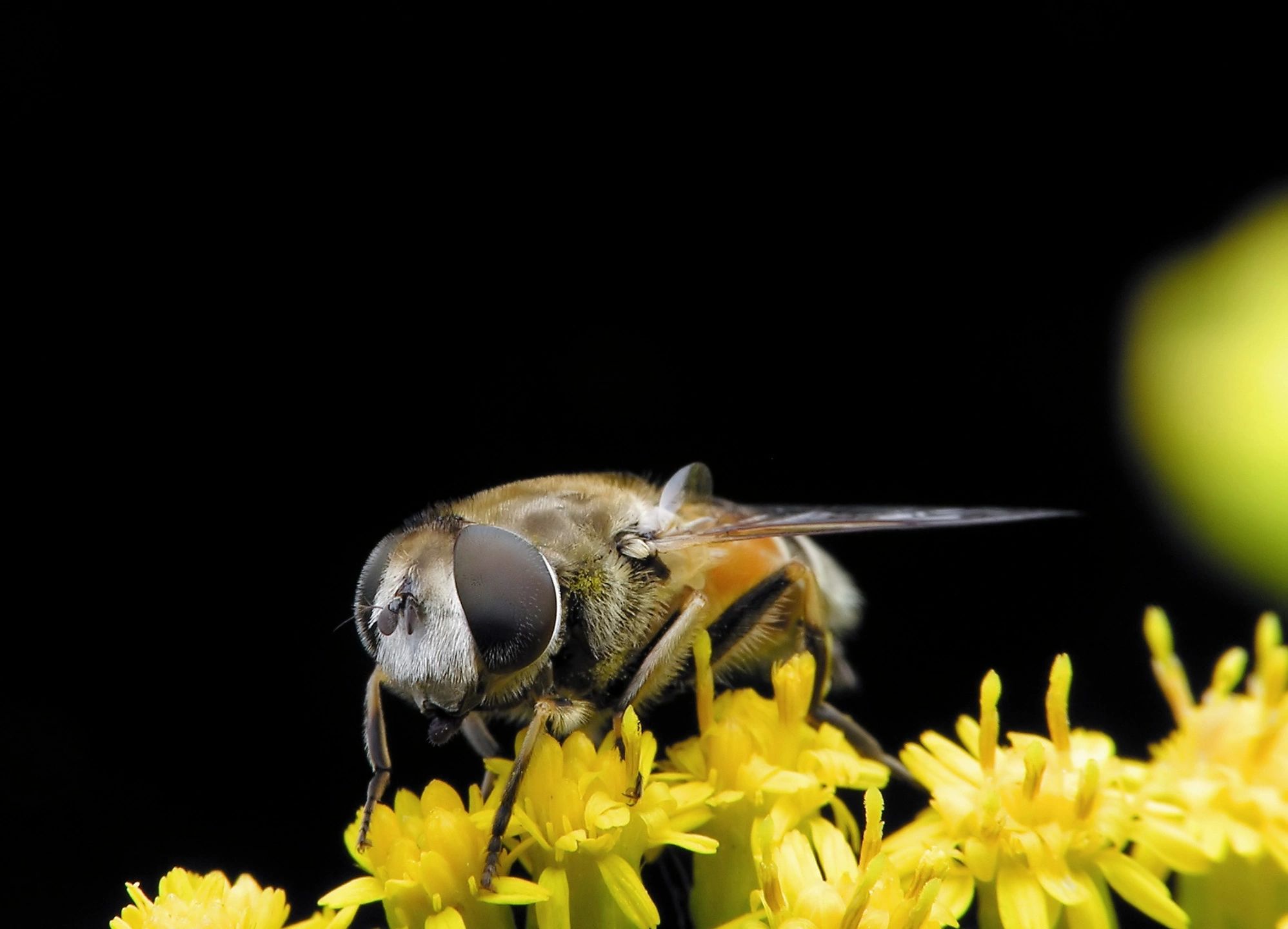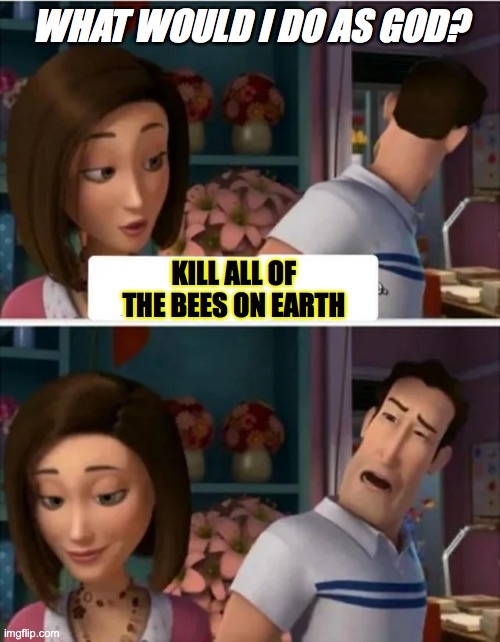That’s Your Solution? Buzz Off...
This is my third time commenting on the importance of bees, but the further I research about them, the more I realize their piece in the world hierarchy to be critical.
Please check out my previous bee-mentions articles where 1) I explain a problem with the Tequila shortage in Mexico & 2) That many therapeutics may be possible by utilizing the long-list of anti-inflammatory benefits of bee venom (weird, right?).
In this article, I want to talk about something less complex but more grandeur–The supply of bees is falling, fast. I know your initial thought is “Good! I hate bees, I got stung when I was twelve, it fuckin’ killed!” but bees are quite critical to the supply chain for us humans.
Follow on X
Pollinators — including bees, butterflies, moths, bats, birds, beetles and other insects — contribute roughly $500 billion a year to global food production (estimates range between 235-577 billion). For sake of reference, the global food production is about $5 trillion annually, so this is 10% of the expenses that are unspent, every year. Aizen et al, 2009 estimates that 3-8% of food production can be attributed to animal pollination. Most people work the entire year for a simple 0.00001% of this amount that we can receive from nature for free. The bee though, is the top pollinator and is responsible for the growth of about 1000 plants. Spices, vegetation, crops, medicines, fibres and all food types require bees to play a role in their ecosystem. Their importance amounts to about $20B USD in just the United States, annually.
Losses
Since 2006, US beekeepers have reported losses to their colony numbers of around 10-15% a year, sometimes ranging as high as 50%. Likewise, a fall from 6 million to 2.4 million hives has been noted from 1970 to 2008.

Lima et al, 2022 in their Editorial article outlined that while scientists and media have taken notice of the declines, they notice that this attention is primarily given to the sole species known as the western honey bee. As a consequence, many conservation efforts neglect the other pollinators.
For more than a decade, beekeepers in South Dakota and around the country have been fighting against historically high annual colony loss rates of more than 30%; the impact has been seen across 100 different plants
The losses are mainly attributed to the use of pesticides, herbicides & insecticides as well as pollutants. Purchasing organic food can greatly reduce these toxic chemicals for pollinators, though this is not always possible.
Several studies have also shown that air pollution affects bees’ ability to recognize the volatile organic compounds (VOCs) from plants and flowers. One study showed that honeybees that were exposed to petrol exhaust pollution took significantly longer to learn plant VOCs and forget them faster.
Starving the Bees:
Studies have also shown that plants enriched with excess nitrogen (fertilizer) lead to the death of larvae and workers in colonies of bumblebees. Excessive enrichment changes the rate at which larvae develop because it increases plant height and reduces the amount of sun from reaching the soil’s surface. Thus, the delicate timing of larval development can become altered and hence the number of offspring are altered.
Bret Adee, a co-owner of Adee Honey Farms, one of the largest beekeeping operations in the world, said some commercial keepers lost 70% or more in recent years; the company had been operating steady for 60 years but were now forced to lay employees off due to the bee shortages
Almond Milk?
Beekeepers like everybody else, head where the profits are going to be. One of the most profitable sectors is utilizing bees to pollinate almonds. Selling honey is far less lucrative than renting out his colonies to mega-farms that produce only almonds.
One beekeeper noticed that 150 of his hives had been wiped out by mites; 12% of his inventory in just a few months. Commercial beekeepers who send their hives to the almond farms are seeing their bees die in record numbers, and nothing they do seems to stop the decline. The explanation behind this is the fact that almond growing is an unnatural monoculture ecosystem for the bee. Beekeepers are knowingly sacrificing millions and millions of bees yearly for the sweet almond profits but the decline is reaching such depths that it risks other crops.
Pollinators are Important
A lot of evidence is now beginning to quantify the role of animal pollination on worldwide crop yield. Pollinators increase in crop yield in at least 75% of the worlds crop types (Klein et al, 2007).
Bishop, Garratt & Nakagawa (2022) have found in their meta-analysis that not only do pollinators contribute to crop yield, but they found that they add to spatial and temporal crop stability as well. Their study looked at 215 experiments comparing animal-pollinated vs. wind or self pollination in apple, oilseed rape and faba bean plants. The yield stability increased by 32% per unit of yield in the animal-pollinated cohort. Increasing the stability of crop yield at a range of spatial & temporal scales is necessary to reduce expenses and the environmental impacts of agriculture–ultimately improving yields.
Animal pollination has been found to compensate agricultural losses from heat loss (Bishop et al, 2016) as well as pest invasions.
Eh… honey sucks
Unfortunately, this extends beyond honey. Food is a global issue without even considering bees or pollinators. The world is headed already in a very precarious position with respect to food supplies. This is straight from the World Food Programme:
In just two years, the number of people facing, or at risk of, acute food insecurity increased from 135 million in 53 countries pre-pandemic, to 345 million in 79 countries in 2023.
Fuelled by conflict, climate shocks and the COVID-19 response, the crisis is escalating as the war in Ukraine drives up the costs of food, fuel and fertilizers. Millions of people are struggling to put food on the table and are being driven closer to starvation in a storm of staggering proportions.
We are at a critical crossroads. We need to rise to the challenge of meeting people’s immediate food needs, while at the same time supporting programmes that build long-term resilience . The alternative is hunger on a catastrophic scale

Since, Ukraine is currently being raised to the ground which is known as the breadbasket of Europe, having some of the most fertile grounds on the planet. Canadian family farms have been closing at the rate of 3 per day with many apartment complexes planned to take their place to house the immense number of migrants. Ireland decided to kill up to 200,000 cows to “save the planet”, which I cannot even fathom words to comment on the stupidity of such an act. Argentina is currently in hyperinflation and Russia may have hindrances of getting wheat to market. Australian ESG nightmarish policies are anti-food through and through and the United States largest agriculture companies are owned by foreign companies.
This diagram, as scary as it is, was created years ago when psychotic policies weren’t in place. The main takeaway for me is how few places are net exporters of food.
Another Conspiracy?
A video has surfaced in New Zealand where the government has forced a beekeeper to burn the whole outfit and destroy all the bees (why bees do you think?). New Zealand’s tyrannical government is pursuing farmers to burn down bee farms after allegedly finding traces of another fictitious disease called foul brood. Remember, no pollinators, no nature, no food, which means extinction!

More Regulation as of 2023: Every beekeeper engaged in beekeeping, who owns one or more hives, is obliged to register at: a) the farm register created according to the legislation in force for agriculture; b) the livestock register, which is kept in the institution responsible for veterinary medicine until 30 April of each calendar year, as regards the number and location of beehives
More bees die every year in the US than all other fish and animals raised for slaughter combined
Homeowners around the planet have been calling on pest-control companies to spray their yards with insecticides to kill mosquitoes and ticks and many anecdotally note increases in mosquitos. That’s causing concern among farmers about the effects on pollinators and other beneficial insects for crops. Guess what Kill Gates wants to do? Unleash MORE mosquitos based on phoney science.
Coincidence?
The Mental Disconnect
I recall hearing a famous scientist show evidence upon years of science that if you want to kill the inputs contributing to the pollution of the planet your best route is to seek to raise the GDP per capita of African countries.
Reducing global pollution, C02 emissions and over-consumption…improved by giving Angolans a greater opportunity to earn more money such as removing tariffs and taxes?
At the same time, I’ve often said that if you want to improve relationships, divorce rates, and the nuclear family unit–go back on the gold standard. The predictability of the earnings, of the currency and the spending on the state can allow for better long-term planning with partners and offer more cultural stability where anxiety of the future is lower.
Long-term sexual relationships & family happiness…improved by tying your currency to gold?

Could this be similar?
Closing
Perhaps this is another one of those strange situations where the answer to these exceptionally complex problems is seemingly entirely unrelated. Just how much added yield of crops could we see by increasing the bee populations? It may be small, but would the margin between risk and reward be worth it? Can biology be supported to mitigate some of our production concerns? Should we be skeptical on the number of mosquitos we seek to deploy?
The more you study biology, the more you will realize that it is far more resilient, long-lasting, powerful and clever than a human mind will ever be. Controlling biology in my opinion (like in almond farming) is an extremely steep hill to climb where the forces are always against you. Rather, it makes sense to take the path of least resistance and continue to exploit nature (if you can’t beat ’em, join ’em) to have biology on our side. We should spend time to understand the value of our obnoxious, stinging friend and how it plays a bigger picture than what meets the eye.
If we fail to acknowledge the importance of this broader ecosystem and the role of pollinators, than it could be yet another factor leading to a catastrophic result to our medicine, fabrics and most importantly, our global food supplies.
#StayOnTheBall


